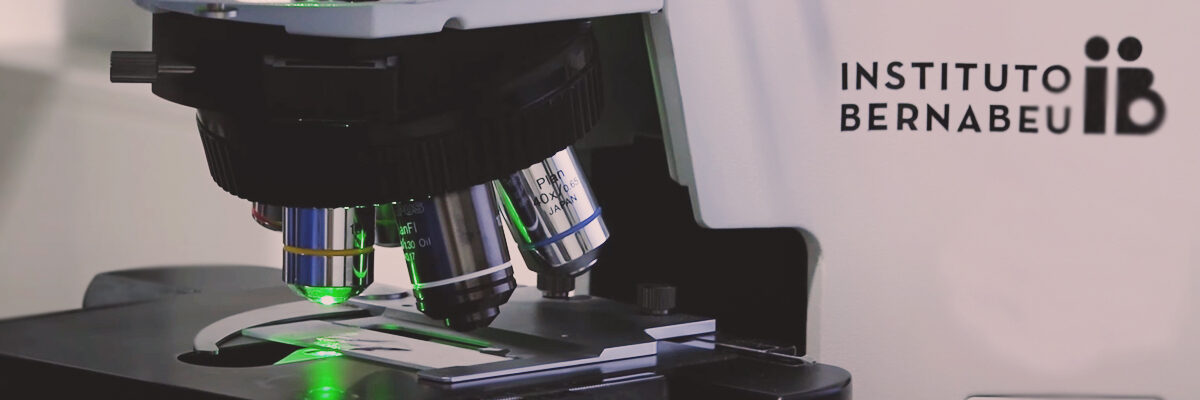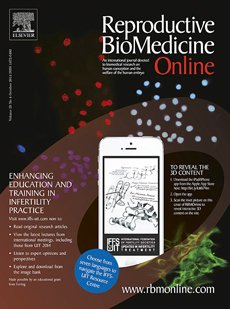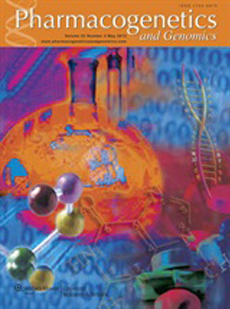IBgen IVF. A genetic study of ovarian reserve
The analysis of genes associated with ovarian reserve enables us to not only make diagnoses, but also to determine the most appropriate medication for each patient
When a couple tries to get pregnant but it does not happen, in many cases, this may be due to ovarian reserve. In those cases in which ovarian reserve is poor and/or of poor quality, getting a larger number of eggs can be the key to success.

Identified the genes involved in ovarian reserve

Personalized treatment plan

Pharmacogenetics: higher response medication

Higher number of eggs
Our research has centred around searching for the genes involved in ovarian reserve with a view to not only making a diagnosis but also to determining the medication to which the patient responds best. This can help improve the prognosis and achieve an increased and improved ovarian response. Instituto Bernabeu Biotech is an international leader in progress in pharmacogenetics within the field of reproductive medicine, having made publications in prestigious scientific magazines and given presentations of its most relevant research in the most significant congresses for this speciality.
What is the IBgen IVF test?
Using a simple saliva or blood test, our team studies the genetic variants which we have determined and verified are involved in ovarian response.
We analyse the genetic variant within the FSH receptor gene, the androgen receptor and the ESR1 (SNP y STRs) and AMHR2 genes.
Along with other markers, the genotype means we are able to determine how a patient will respond with a great deal of precision, before treatment has begun. This favours the process of determining the most suitable line of medication for the patient, using the gonadotropins that will generate an optimum response and adjusting the dose to the genotype.
It also evaluates genetic risk factors on ovarian reserve and means the patient can be made aware, in advance, of the possible issues surrounding poor ovarian response.
What advantages are there to the IBgen IVF test?
- It identifies the genetic cause behind poor ovarian response and it not only provides a diagnosis but also the treatment. Based on genetic counselling, it determines the most suitable medication for optimising ovarian response.
- It increases the efficiency of the treatment of the assisted reproduction technique.
- Getting an in-depth understanding of the pathology reduces the anxiety and emotional stress which is understandably associated with patients who have reproduction issues.
When is it advisable to have the IBgen IVF test?
- Any patient who is a poor responder and who wishes to undergo an in-depth diagnosis of their pathology in order to have their genotype and receive the treatment programme to which they will respond the best.
- Any patient searching for the medication which best suits their genetic make-up before undergoing in vitro fertilisation.
- Any patient who, whether for personal interest or as a result of family or medical precedents, wishes to know if she will suffer from poor ovarian reserve in the future. This can help when planning for motherhood.
What is the scientific basis for the IBgen IVF study?
We have carried out prior research on over 300 patients and 400 ovarian stimulation cycles in order to analyse the role the genotype plays in ovarian response in patients who undergo treatment with gonadotropins.
We have also evaluated the prevalence of those variants in patients with poor ovarian response.
Our results show that these variants can be used as a factor in prediction and diagnosis of poor ovarian reserve. Variants in the FSH gene receptor may also be used in order to determine the most suitable dose and gonadotropin for ovarian stimulation in the patient.
This pharmacogenetic approach means that IVF treatment may be individualised and optimised and the patient can be provided with information on why she is a poor responder and the risks of this happening again in the future.
Published scientific research carried out by Instituto Bernabeu which supports the scientific evidence of the IBgen IVF study.
Scientific research presented in national and international congresses which supports the scientific evidence of the IBgen IVF study.
- XXXI Congreso Nacional de la Sociedad Española de Fertilidad (SEF). Málaga. Mayo 2016.
- BFS Annual Meeting 2016. Newcastle, UK. January 2016.
- Relevance of single nucleotide polymorphism on POLG and EXO1 in patients with low ovarian reserve. Poster. J. Ll. Aparicio, JA. Ortiz, N. Carrión, B. Lledó, R. Morales and R. Bernabeu.
- ESHRE Annual Meeting. Lisbon, Portugal. June 2015.
- FSHR genotype is associated with different response to wild type FSH versus recombinant FSH. B. Lledo, P. Dapena, R. Morales, JA. Ortiz, A. Turienzo, J. Guerrero, J. Ll. Aparicio, R. Bernabeu. Poster.
- XXX Congreso Nacional de la Sociedad Española de Fertilidad (SEF). Barcelona. Mayo 2014.
- Modelo genético multifactorial de predicción de la baja respuesta ovárica: utilidad en la preservación de la fertilidad. JA. Ortiz, J. Ll. Aparicio, A. Turienzo, B. Lledo, R. Morales, L. Luque, R. Bernabeu. Comunicación Oral.
- Identificación y caracterización de polimorfismos en genes del sistema inmunológico que están asociados con la baja respuesta ovárica. JA. Ortiz, J. Ll. Aparicio, A. Turienzo, B. Lledo, R. Morales, L. Luque, JC. Castillo, R. Bernabeu.Comunicación Oral.
- La longitud del polimorfismo CAG en el receptor de andrógenos está asociada con la reserva ovárica pero no con la respuesta ovárica. B. Lledó, J. Ll. Aparicio, A. Turienzo, JA. Ortiz, R. Morales, A. Fabregat, J. Guerrero, R. Bernabeu.Comunicación Oral.
- VII Congreso ASEBIR. Sevilla. Noviembre 2013.
- Efecto del SNP N680S del receptor de la FSH (FSHR) sobre la respuesta ovárica en donantes de ovocitos. J.A. Ortiz; A. Turienzo; B. Lledo; J. Guerrero; R. Morales; J. Ten; J. Ll. Aparicio; R. Bernabeu. Póster.
- ASRM Annual Meeting. Boston, Massachusetts, USA. October 2013.
- Prediction of low ovarian reserve using a multifactorial genetic model. J. Ortiz, J. Ll. Aparicio, A. Turienzo, R. Morales, B. Lledó and R. Bernabeu.
- Polymorphisms in inmune pathway genes (IL11 and PRRC2A) are associated with poor ovarian response. J. Ll. Aparicio, J. A. Ortiz, A. Turienzo, L. Luque, B. Lledó and R. Bernabeu.
- ESHRE Annual Meeting. London. July 2013.
- The European Human Genetics Conference 2013. Paris, France, June 8-11, 2013.
- N680S polymorphism on the FSHR gene and its effect on ovarian donor follicle stimulating hormone stimulation. J.A. Ortiz, A. Turienzo, B. Lledo, J. Guerrero, R. Morales, J. Ten, J. Ll. Aparicio, R. Bernabeu.
- XXVII Congreso Nacional de la Asociación Española de Genética Humana (AEGH). Madrid. Abril 2013.
- Efecto del SNP N680S en el receptor de la FSH sobre la estimulación ovárica. Morales, R., Lledó, B., Guerrero, J., Turienzo, A., Ortiz, J. A., Ten, J., Ll. Aparicio, J., Bernabeu, R.
- Análisis de polimorfimos del Receptor de Andrógenos (AR) y de la hormona FSH (FSHR) y su relación con el fallo ovárico precoz (FOP). Turienzo, A., Lledó, B., Ortiz, J.A., Morales, R., Luque, L., Araico, F., Rodríguez, Ll. Aparicio, J., Bernabeu, R.
- 68th ASRM Annual Meeting. San Diego, California. Octubre 2012.
- Androgen receptor Polymorphisms are associated with poor ovarian response. J. Ll. Aparicio, J.A. Ortiz, J. Guerrero, B. Lledó, J. Ten, R. Bernabeu. 2º premio al mejor póster del congreso ASRM (American Society for Reproductive Medicine).
- Androgen receptor Polymorphisms are associated with poor ovarian response. J. Ll. Aparicio, J.A. Ortiz, J. Guerrero, B. Lledó, J. Ten, R. Bernabeu. 2º premio al mejor póster del congreso ASRM (American Society for Reproductive Medicine).



